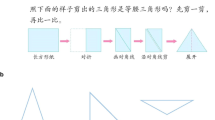Abstract
The purpose of this study was to explore teachers’ growth in understanding of algebra using concept maps. The study was set in the context of a five-year National Science Foundation funded teacher retention and renewal professional development project. In this project both beginning and experienced teachers are supported as they increase their understanding about mathematics, their ability to implement effective mathematics practices in their classrooms, and their knowledge of working with English Learners. Results indicate that teachers’ algebraic knowledge structures became more complex and connected as a result of their professional development. In addition, they were able to adapt their knowledge networks to incorporate important aspects of algebra into them. Concept maps are recommended to other leaders of mathematics professional development as a means of assessing change.
Similar content being viewed by others
References
Ball, D. L. (2000). Bridging practices: Intertwining content and pedagogy in teaching and learning to teach. Journal of Teacher Education, 51, 241–247.
Bolte, L. A. (1999). Enhancing and assessing preservice teachers’ integration and expression of mathematical knowledge. Journal of Mathematics Teacher Education, 2(2), 167–186.
Goldsmith, L. T., & Shifter, D. (1997). Understanding teachers in transition: Characteristics of a model for the development of mathematics teaching. In E. Fennema & B. S. Nelson (Eds.), Mathematics teachers in transition (pp. 19–54). New Jersey: Lawrence Erlbaum Associates.
Hersh, D. (1987). What is mathematics really? Oxford: Oxford University Press.
Hough, S. (2001). The development of prospective teachers’ understandings of doing mathematics: To what extent do they effect achievement and classroom activity? Doctoral Dissertation, University of California, Santa Barbara.
Huerta, P. M., Galan, E, & Granell, R. (2003). Concept maps in mathematics education: A possible framework for student’s assessment. Department de Didactica de la Matematica, Universitat de Valencia.
Jones, M. G., Carter, G, & Rua, M. J. (2000). Exploring the development of conceptual ecologies: Communities of concepts related to convection and heat. Journal of Research in Science Teaching, 37(2), 139–159.
Jones, M. G., Rua, M. J., & Carter G. (1998). Science teachers’ conceptual growth within Vygotsky’s zone of proximal development. Journal of Research in Science Teaching, 35(9) 967–985.
Ma, L. (1999). Knowing and teaching elementary mathematics. New Jersey: Lawrence Erlbaum Associates.
Morine-Dershimer, G. (1993). Tracing conceptual change in preservice teachers. Teaching and Teacher Education, 9(1), 15–26.
National Council of Teachers of Mathematics. (2000). Principals and standards for school mathematics. Reston, VA: NCTM.
Novak, J. D. (1998). Learning, creating and using knowledge: Concept maps as facilitative tools in schools and corporations. Mahwah, NJ: Erlbaum.
Novak, J. D., & Gowin, D. B. (1984). Learning how to learn. Cambridge: Cambridge University Press.
Novak, J. D., & Msonda, D. (1991). A twelve year longitudinal study of science concept learning. American Educational Research Journal, 28, 117–153.
Skemp, R. (1987). The psychology of learning mathematics. Hillsdale, NJ: Lawrence Erlbaum Associates.
Stevens, J. (1996). Applied multivariate statistics for the social sciences (3rd ed.). Mahwah, New Jersey: Lawrence Erlbaum Associates, Publishers.
Thompson, A. G., Philipp, R. A., Thompson, P. W., & Boyd, B. A. (1994). Calculation and conceptual orientation in teaching mathematics. In D. B. Aichele (Ed.), Professional development for teachers of mathematics (pp. 79–92). Reston, VA: National Council of Teachers of Mathematics.
Weber, R. P. (1990) Basic content analysis (2nd ed.). Newbury Park, Calif.: Sage Publications.
Weissglass, J. (1994). Changing mathematics teaching means changing ourselves: Implications for professional development. In D. B. Aichele (Ed.), Professional Development for Teachers of Mathematics (pp. 68–78). Reston, VA: National Council of Teachers of Mathematics.
Winitzky, N., Kauchak, D., & Kelly, M. (1994). Measuring teachers’ structural knowledge. Teaching & Teacher Education, 10(2) 125–139.
Acknowledgements
This project is funded by the National Science Foundation, grant #ESI-0101995. Any opinions, findings, and conclusions or recommendations expressed herein represent those of the authors and do not necessarily represent those held by the sponsoring agencies.
Author information
Authors and Affiliations
Corresponding author
Rights and permissions
About this article
Cite this article
Hough, S., O’Rode, N., Terman, N. et al. Using concept maps to assess change in teachers’ understandings of algebra: a respectful approach. J Math Teacher Educ 10, 23–41 (2007). https://doi.org/10.1007/s10857-007-9025-0
Received:
Accepted:
Published:
Issue Date:
DOI: https://doi.org/10.1007/s10857-007-9025-0




